Beware the Boomerang
Bigots, whether as individuals or as political actors, tend to hate immigrants and queers. They see the former – especially if racially different -- as invaders bringing contagion, whether symbolic, in the sense of “inferior” foreign cultures, or literal, i.e., infectious disease. Sexual minorities are seen as an internal menace, a moral infection that undermines “traditional” values and social structures. Check the political platform of any right-wing political party or formation and you’ll see the “gemellaggio” – twinning— of homophobia and nativism.
This equation doesn’t always hold. Two (deceased) politicos, Jorg Haider of Austria and the Netherlands’ Pim Fortuyn, were gay men who led right-wing, anti-immigrant political parties. And members of racial, ethnic and religious minorities certainly can be homophobic. African Americans in California supported Proposition 8, the anti-gay marriage ballot initiative, and in
Europe, Muslim groups that denounce “Islamophobia” often are vociferously anti-gay.
But in general, the proposition, scratch a racist and find a homophobe (and vice versa), is pretty reliable, especially in politics.
In Italy, anti-racist and gay activists are now approaching these issues as one. Last month, ARCI -- Associazione Ricreativa e Culturale Italiana, a national association of social and cultural groups formed in 1957 under the auspices of the Italian Communist Party -- launched its campaign, “Racism is a Boomerang,” with a press conference at the Italian parliament.
“Racism, and the many ways in which it is manifested, represent a danger not only for those who experience its consequences, but also for democracy, because only by defending the rights of all is it possbile to guarantee the rights of everyone,” stated the ARCI press release.
“This is why we call it a boomerang, whose dramatic effects are destined sooner or later to strike also those who promote and practice it.”
A poster from the campaign illustrates the theme. It features a photo of a bald black man and a grey-haired woman, looking directly at the viewer. The text between them states, “You call us dirty nigger and disgusting lesbian. But you’re offended if someone calls you an Italian mafioso.” The tagline reads, “Racism is a boomerang. Sooner or later it comes back to you.”
The man and woman in the ad aren’t just any black man or lesbian. They are Jean- Léonard Touadi, the African-born and only black member of the Italian parliament, elected from the Italia dei valori (Italy of Values) party, and Anna Paola Concia, a lesbian activist elected last year from the Partito democratico (Democratic Party).
The ARCI campaign, by linking two distinct forms of prejudice, might seem simplistic.Though both are common to the political Right, racism and homophobia have different social and psychological roots, and they manifest themsleves in different ways. But in an Italian context, the link makes sense. The term “razzismo” is often used in Italy to describe not only racial prejudice but other kinds of bigotry and discrimination – against gays, women, Sicilians and other southern Italians. More specific terminology, like “omofobico” (homophobic) and “sessista” (sexist) may be used, but in my experience, far less often than “razzista.”
To non-Italians, the comparison between racial and anti-gay prejudice and the stereotyping of Italians as mafiosi might seem a stretch. But for many Italians, the enduring association of their nationality with organized crime definitely rankles, and for them constitutes a form of “razzismo.”
ARCI says that the “Boomerang” posters will appear all over Italy. I’ve read media accounts and have received reports from friends in Rome who have seen the posters there, including near the Termini transportation hub. The neighborhoods near Termini have high concentrations of both immigrants and gays. But the broader visibility that would come from the posters appearing nationwide, and in such critical venues as schools and other public institutions, seems unlikely in today’s Italy, governed by the anti-immigrant, racist, and anti-gay Right.
Still, I can only commend ARCI for trying to raise consciousness about racism and homophobia, which, though different forms of intolerance, are both toxic, for their victims and for a democratic society.
Arcigay, Italy’s national gay rights organization affiliated with ARCI, has issued a new report, “La Montagna e La Catena - Essere Migranti Omosessuali Oggi In Italia” (The Mountain and the Chain: Being Gay Immigrants in Today’s Italy). The 41-page document draws its conclusions mainly from interviews conducted with gay and lesbian immigrants in Italy. The findings are organized around 12 themes, which include the immigrants’ experience of being gay in their countries of origin and in Italy, their relations with their communities of origin, their participation in Italian gay life, their access to health and social services, and their experiences of being in same-sex relationships with native Italians.
The report noted that public and non-governmental services for immigrants, a new phenomenon in Italy, aren’t responsive to the needs of non-heterosexual newcomers, and that the information, counseling, and support services provided by Italian gay organizations often presume a “Western” model of sexual identity that non-Western immigrants might not accept.
Some respondents said that although they felt there was a “double stigma” attached to being both foreign and gay in Italy, the former condition presented more problems because racial and ethnic difference is more difficult to hide than sexual identity. For these immigrants, it’s easier to be gay in Italy than in their countries of origin. An Iranian man told the Arcigay researchers, “I come from a country where I cannot exist…here at least I’m not afraid to live.”
But a Peruvian, when asked which people had more difficulty accepting homosexuality, Italians or his co-nationals, replied, “The Italians,” because of “the Pope” and their purported greater adherence to Church teachings. “We Peruvians are Catholic, too,” he said. “But we understand. We understand.”






























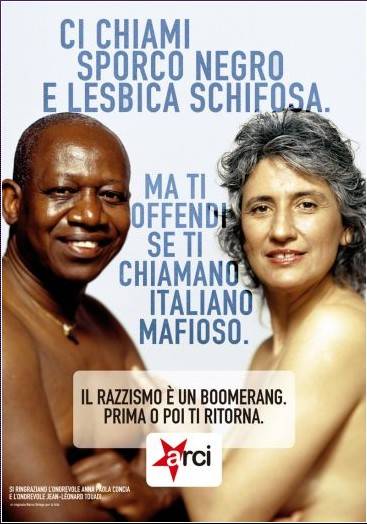
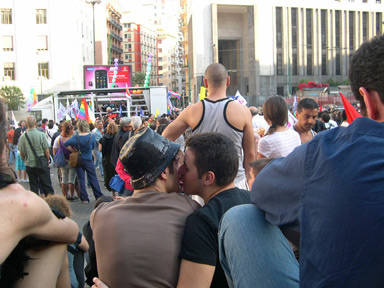
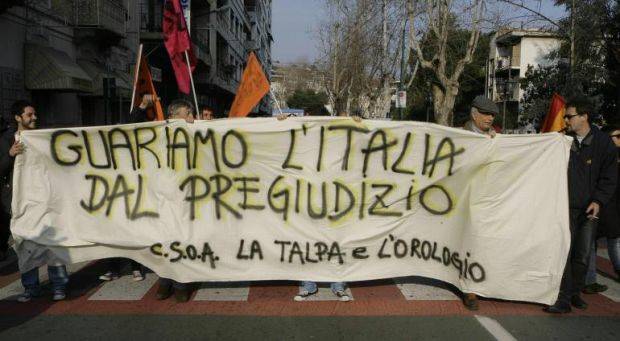
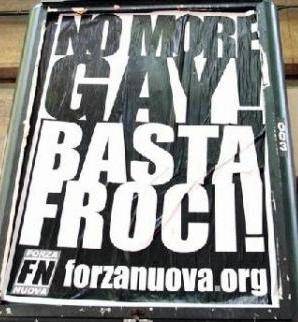

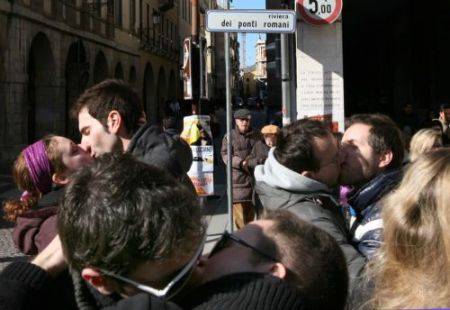
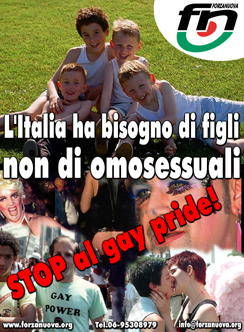
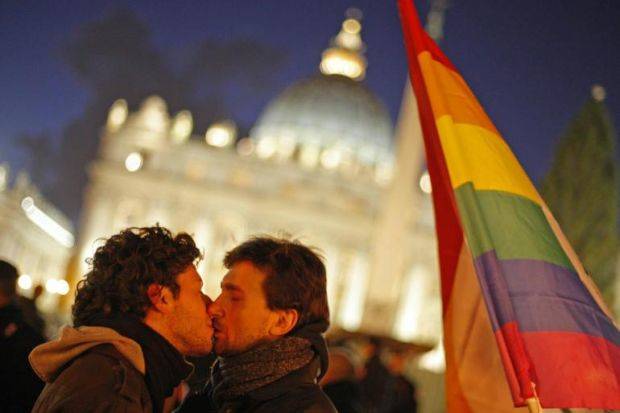
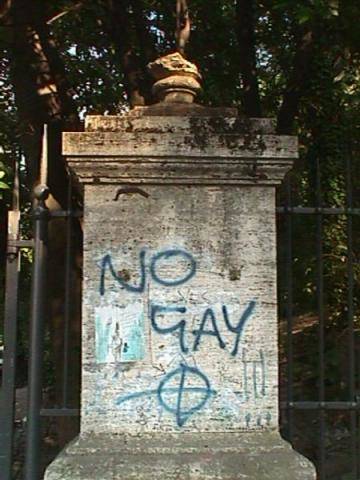
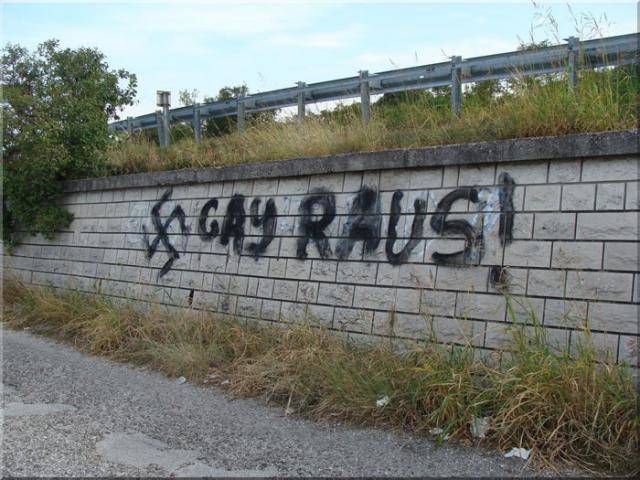






i-Italy
Facebook
Google+
This work may not be reproduced, in whole or in part, without prior written permission.
Questo lavoro non può essere riprodotto, in tutto o in parte, senza permesso scritto.